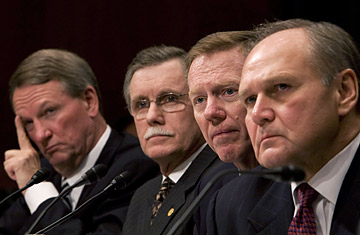
From left are: Richard Wagoner, Chairman and CEO of General Motors, President of the United Auto Workers International Union Ron Gettelfinger, Alan Mulally, President and CEO of Ford Motor Company, and Robert Nardelli, Chairman and CEO of Chyrsler LLC.
Washington is engaged in a giant game of chicken with the Big Three automakers, and unless someone swerves soon, Detroit is going to end up as wreckage on the side of the road.
In their first day of testimony before Congress, the chief executives of Ford, General Motors and Chrysler were the picture of humility. Hats in hand, they pleaded for money. "We made mistakes, which we're learning from," GM's Rick Wagoner told the Senate Banking Committee, outlining plans for change that Congress had requested as a precondition for receiving billions of dollars in much needed loans. Ford's Alan Mulally said his company has shifted "in a completely new direction." (See the 50 worst cars of all time.)
Unlike the hearings last month, though, when Congress presented a nearly united, hostile front against the Big Three, the fight Thursday was not so much over whether Washington should let them fail; almost all the witnesses and lawmakers agreed that would be like "playing Russian roulette with the economy," as Senate Banking Committee Chairman Chris Dodd put it. But that didn't mean there was anything like a consensus on how to handle the urgent request for a total of $34 billion in bridge loans — $7 billion for Chrysler, $9 billion for Ford and $18 billion for GM. Democrats and Republicans clearly still have major disagreements about where the money should come from, how much Detroit should get up-front and what kind of conditions to impose for such government assistance.
The Bush Administration, leery of adding yet another taxpayer bailout to its already shaky legacy, has been unwilling to step in, appoint a car czar and negotiate a solution to the problem. The incoming Obama Administration is expecting such talks to fall to it, but the automakers, especially GM, have warned they cannot wait. "I believe that we could lose General Motors by the end of this month," said Ron Gettelfinger, head of the United Auto Workers (UAW) union, which announced Wednesday that it would be willing to sacrifice job-security provisions and financing for retiree health care to save the companies — major concessions reflecting the seriousness of the situation.
Sympathetic Democrats like Charles Schumer of New York suggested that the most realistic solution would be to appropriate just enough money to keep the companies alive until early next year, when a new Congress and Administration can tackle the complicated issue in a more comprehensive fashion. But even if a short-term fix of, say, $15 billion, is approved to keep Detroit going until the end of March, there is still disagreement over many details. Republicans want to take the money from a $25 billion modernization fund set up earlier this year, but environmentalists are adamantly opposed to such a move. And as House Speaker Nancy Pelosi's office pointed out, the companies factored in using at least $21 billion of those funds to get back on their feet in plans they submitted Tuesday to Congress.
Democrats prefer to use money from the $700 billion that was approved in September to bailout the banking system, a move opposed by President Bush, Treasury Secretary Henry Paulson and most congressional Republicans. In the Senate, especially, Dems need at least nine Republicans to pass veto-proof legislation, assuming they can count on all their members, which makes coming to a deal in a lame-duck session particularly difficult. Other options Democrats are exploring include asking the Federal Reserve to supply the loans or requiring the banks that the government is currently bailing out to loan the money to the Big Three. As an alternative, Utah Senator Bob Bennett suggested Thursday that those banks getting money from the Treasury be required to convert any carmaker debt that they hold into equity, thereby easing the Big Three's cash crunch.
